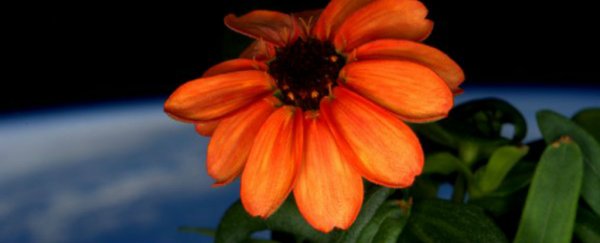For anyone who's ever struggled to keep a plant alive on their desk, if you don't feel incompetent enough already, you should probably know that astronauts have just grown perfect zinnias on the International Space Station (ISS). You know, that place with zero sunlight and microgravity conditions that are known to do weird things to biological processes.
Your own personal failings aside, the fact that astronaut Scott Kelly and his orbiting colleagues managed such a feat is really exciting, because it hints at what might be possible on a lunar, or perhaps even Martian, settlement in the not-so-distant future.
The bright orange zinnias were cultivated in the Vegetable Production System (Veggie), which is a deployable plant growth unit capable of producing a range of crops, including the first ever space lettuce, which the ISS crew taste-tested back in August.
The plastic-wrapped Veggie system provides LED lighting and nutrients for the plants inside, and relies on the surrounding cabin environment to maintain optimal temperature and carbon dioxide levels. But as sophisticated as the technology is, the months-long journey from seed to flower has been anything but hands-off for the crew.
"There was mould, drought, and flooding in the roots. There were gardening guidelines, urgent, 4am phone calls, and distressed tweets. Some plants didn't make it and had to be clipped off," Lonnie Shekhtman reports for The Christian Science Monitor.
Fortunately, Kelly is anything but a quitter, and took it upon himself to turn things around after a post-Christmas bout of plant rot.
Our plants aren't looking too good. Would be a problem on Mars. I'm going to have to channel my inner Mark Watney. pic.twitter.com/m30bwCKA3w
— Scott Kelly (@StationCDRKelly) December 27, 2015
After weeks of experimentation, the crew figured out that fans could be used to gently dry out the plants after too much humidity fostered mould, but they had to keep adjusting the fan strength after initially drying the plants out because they hadn't upped the water supply. All of that stress ended up killing two of the four zinnias, but two survived to blossom fully over the weekend.
While they're certainly the most beautiful flowers to have ever been grown in space, they're not the only flowers to have a cosmic birth, despite what Kelly's tweet below says:
First ever flower grown in space makes its debut! #SpaceFlower #zinnia #YearInSpace pic.twitter.com/2uGYvwtLKr
— Scott Kelly (@StationCDRKelly) January 16, 2016
Back in 1982, the Soviets managed to grow some Arabidopsis plants on board the ISS, and the Guiness Book of Records declared them to be the first plants to flower and produce seeds in space. More recently, US astronaut Don Petitt successfully grew a sunflower, but it didn't exactly blow anyone away with its beauty.
Magestic or shrivelled, space flowers and space crops are going to be crucial to our future colonisation plans, and we still have a whole lot to learn. "The unexpected turns experienced during this Veggie run have actually offered bountiful opportunities for new learning and better understanding of one of the critical components to future journeys to Mars," says NASA.
